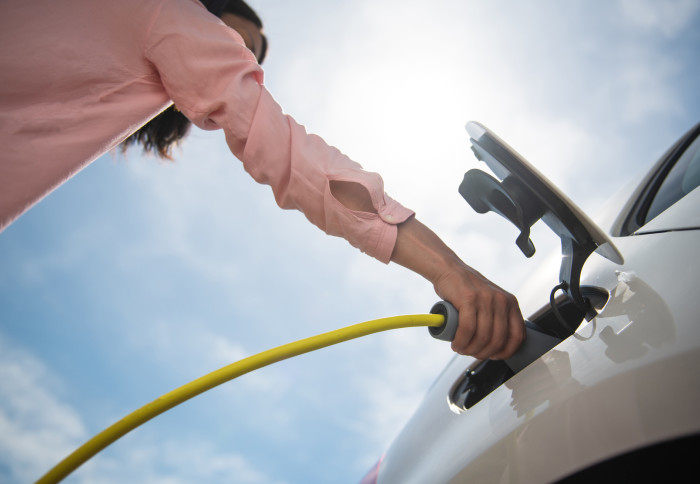EVs could play crucial role in stabilising power grid, saving money and carbon

Britain’s growing fleet of electric vehicles (EVs) could play a critical role in supporting the electricity grid, Imperial research has shown.
The study, led by Cormac O’Malley from the IDLES Programme at Imperial College London, demonstrates how grid operators can unlock the potential of Vehicle-to-Grid (V2G) technology despite uncertainty over EV charging patterns.
Smart V2G chargers allow power stored in EV batteries to be sent back to the grid when needed, turning the vehicles into flexible assets that can be controlled to help balance unexpected changes in electricity supply or demand.
Such volatility is expected to become more common as we move towards a grid that is increasingly reliant on intermittent energy sources like wind and solar, but, at present, fossil fuel generators provide the most reliable way of dealing with the problem.
Electric vehicles, according to O’Malley, offer a promising alternative, thanks in large part to their relative abundance; as many as 20 million electric cars are expected to be on British roads by the early 2030s.
Electric vehicles offer a solution that is not only much less expensive than traditional providers of flexibility services, but also far more environmentally friendly. Cormac O'Malley IDLES Programme
Until now, the use of EVs for flexibility services has been hampered by uncertainty over the number of vehicles connected to the grid, and therefore the amount of flexibility an aggregate fleet can provide, at any given moment in time.
In this work, for the first time, a comprehensive framework to schedule flexibility from EVs with explicit deliverability guarantees has been created, providing reassurance to system operators and making it easy to compare flexibility from EVs with fossil fuel generators.
To characterise EV travel patterns, the researchers ran simulations of Britain’s 2030 power system using real data from over 25,000 UK charging points. The results showed that by using the framework developed, each V2G charger reduced annual grid-operating costs by £6,300 and saved over 37 tonnes of CO2 emissions.
“Electric vehicles offer a solution that is not only much less expensive than traditional providers of flexibility services, but also far more environmentally friendly because you cut out the emissions created when, for example, you burn more gas to balance the grid,” Cormac explains.
“While it’s not possible to control or to know precisely the number of vehicles connected to the grid at any time, using this model, we can ensure that grid operators can access a reliable source of inexpensive and environmentally friendly flexibility services. This is good for EV owners as well because they will get paid to provide these services.”
The research was conducted as part of the Integrated Development of Low-carbon Energy Systems programme at Imperial, a five-year research programme which aims to provide the evidence needed to facilitate a cost-effective and secure transition to a low-carbon future.
Funded by EPSRC and industrial partners, the programme brings together researchers from across the Faculties of Engineering and Natural Sciences and the Imperial College Business School.
Cormac O’Mally is the host of Low Carbon Conversations, a five-part podcast series produced by Energy Futures Lab on the challenges and opportunities presented by clean energy technologies.
O'Malley, L. Badesa, F. Teng and G. Strbac, "Frequency Response From Aggregated V2G Chargers With Uncertain EV Connections," in IEEE Transactions on Power Systems, 2022, doi: 10.1109/TPWRS.2022.3202607.
Article supporters
Article text (excluding photos or graphics) © Imperial College London.
Photos and graphics subject to third party copyright used with permission or © Imperial College London.
Reporter
Conor McNally
The Grantham Institute for Climate Change